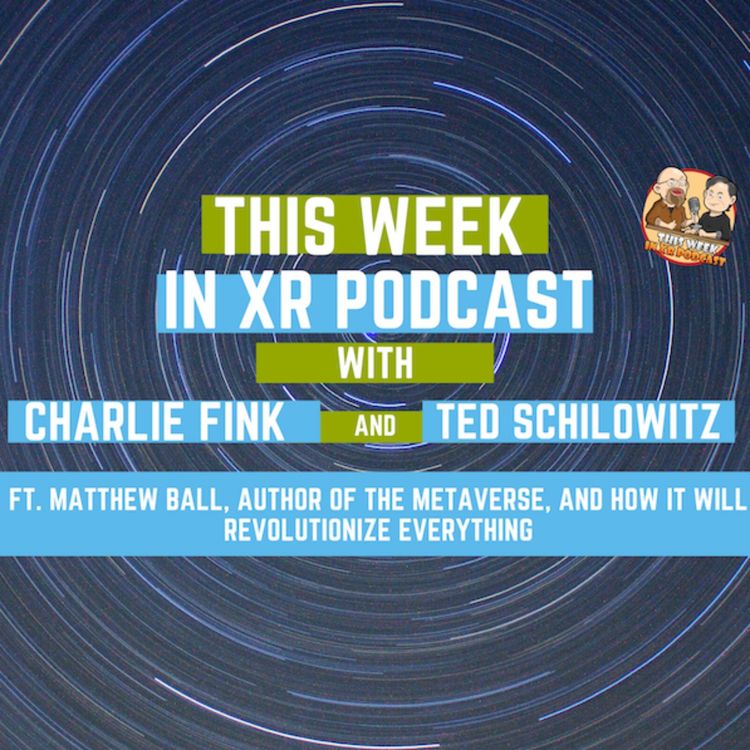Share

AI XR Podcast
This Week In XR 7-13-22 Special Episode ft. Matthew Ball
•
This special episode our hosts sit down with Matthew Ball, Author of The Metaverse, and How It Will Revolutionize Everything.
Thank you to our sponsors, Virbela & Zapper!
Don't forget to like, subscribe, and share!
More episodes
View all episodes

Why Spatial Computing Is Harder Than Mars: XR Hype & Smart Glasses – Antony 'SkarredGhost' Vitillo
38:19|Antony “Skarred Ghost” Vitillo—legendary XR blogger, developer, and authentic voice of the immersive tech world—joins Charlie Fink, Ted Schilowitz, and Rony Abovitz for a sharp, candid take on why spatial computing keeps breaking hearts (and bank accounts). Vitillo, calling in from Torino (and Nutella country), takes listeners inside his evolution from reluctant Twitter handle-user to one of the industry’s essential critical thinkers. With 30,000+ social followers and nearly a decade at the helm of the Skarred Ghost blog, Tony has borne witness to every device cycle, product hype wave, and reality check XR can muster.The hosts open with news that captures the collective whiplash of the sector: Samsung finally names its long-awaited “Moohan” headset the Galaxy XR; Apple is reportedly pivoting away from Vision Pro follow-ups in favor of pursuing AI smart glasses, chasing the hardware trend Meta has tried to lead—with several Magic Leap alumni shaping both companies’ next moves. Meanwhile, OpenAI’s Sora 2 outpaces Google’s Veo 3 in text-to-video generation, and “AI feeds” continue to spark debates about separating synthetic from real in our content streams.Guest HighlightsVitillo unveils XR truths learned the hard way:From accidental blogger to “Master Yoda”: Tony’s accidental rise began with an anonymous Twitter handle, a failed AR/VR startup, and a mentor’s advice to “own” XR expertise—eventually outlasting the startup itself.The real cost of authenticity: European sensibilities (practical, cost-effective, resistant to Silicon Valley bombast) shaped Tony’s on-the-ground verdicts: the Google Glass era was “too early,” even good implementations often wither outside logistics and niche use-cases.Product vs. Prototype and the patience gap: Tony, Rony, and Ted all agree: too many XR launches are rushed by investor pressure from prototype to product, skipping the long, hard path of patience. Meta’s Quest Pro is called out as a textbook “rush job” that failed to meet real readiness.Why XR is “harder than Mars:” Decades and $150B+ spent, yet still no universal hit. Tony argues the impossible form factor challenge (stuffing room-scale computation into eyewear) is compounded by deeper neuroscience—humans simply recoil from something too “in your face.” Physics is tough, but brains and social norms are the real brick wall.Why Roblox, not VRChat, “won” the metaverse: Most of the sector’s big dreams faded back to mobile during and after Covid. With Rec Room, VRChat, and others all scaling back, Roblox’s mass adoption proves device accessibility outweighs idealism. Tony expects cycles of platform hype, but says only rare combinations of luck, timing, and use-case ever sustain an audience.News Highlights Samsung’s “Moohan” headset renamed Galaxy XR—signaling mainstream branding push into the AR/VR hardware race.Apple shifts Vision Pro focus toward AI smart glasses—pivot after slow sales and sector criticism, echoing Meta’s latest headset push.OpenAI Sora 2 outpaces Google’s Veo 3—AI video generation heats up, new feeds spark debates over AI vs. real content in social media.XR product launches called out for impatience—Meta’s Quest Pro and others critiqued as rushed from prototype to product.Thanks to This Episode's SponsorsZappar's Mattercraft - 3D web development with AI assistant for real-time design and debuggingViture XR Glasses Luma Series - 52-degree field of view, 152-inch virtual screen for mobile gaming
33 Years of AI XR Innovation & the GameStop of Smart Glasses. Paul Travers, CEO, Vuzix
48:08|Paul Travers, founder and CEO of Vuzix Corporation, returns to join hosts Charlie Fink, Ted Schilowitz, and Rony Abovitz for a masterclass in enterprise XR resilience and the long game of hardware innovation. As the architect behind the world's first consumer VR headset (the VFX1 in 1992), Travers has survived every boom and bust cycle in wearable technology for over three decades. Now publicly traded with 80,000 shareholders, Vuzix represents what Rony calls "the GameStop of XR"—a dramatically undervalued company ($200M market cap) that could become the consolidation hub for smaller XR startups while taking on tech giants with superior enterprise focus and manufacturing capabilities.The episode opens with the hosts' unfiltered critique of Meta's recent Connect announcements, where Rony argues that despite $100+ billion invested in Reality Labs, Meta's Ray-Ban display glasses represent minimal advancement over the original Google Glass—a "disappointing" return that small startups with minimal funding are already surpassing. This sets the stage for deeper discussions about Neon, the controversial app paying users $800/month to record conversations for AI training (which Rony compares to Neal Stephenson's "gargoyles" from Snow Crash), and Meta AI's new "Vibes" feed that separates AI-generated content from real-world posts to address deepfake concerns.Guest HighlightsTravers pulls back the curtain on three decades of XR survival:The "Lindy Effect" advantage—how Vuzix's longevity through multiple extinction events creates predictive value for continued success, like "alligators surviving when everything else didn't make it"Enterprise-first strategy—why focusing on warehouse workers, Amazon distribution centers, and pharmaceutical operations (1,000+ systems deployed at Nadro) creates sustainable revenue streams versus consumer fashion battlesManufacturing at scale—Vuzix's Rochester facility produces 1.5 million waveguides annually at 90%+ yield rates, enabling 10,000-unit weekly deliveries and potential silicon carbide waveguide production (the same exotic technology Meta claims costs $10,000 per pair in their Orion prototypes)AI-agnostic platform approach—unlike Meta's closed ecosystem, Vuzix allows BMW, Amazon, and other enterprise clients to run their own AI models locally through NVIDIA Blueprint technology for IP protectionThe "GameStop potential"—with smart money recognizing XR's AI-enabled inflection point, Travers envisions Vuzix becoming the acquisition vehicle for consolidating smaller XR companies, potentially reaching the $20+ billion valuation that experience and manufacturing capability warrantNews Segment HighlightsMeta Connect critique reveals $100+ billion Reality Labs investment yielded minimal advancement over original Google Glass—disappointing monocular displays that startups with minimal funding already surpassNeon app controversy pays users $800/month to record conversations for AI training, creating "voice gargoyles" that transform people into data input mechanismMeta AI launches "Vibes" newsfeed separating AI-generated content from real-world posts to address deepfake and authenticity concerns across social platformsChatGPT privacy settings reminder that users can disable data sharing through hidden personalization and security menus to avoid training their AI replacementsThank you to our sponsors, Zappar and Viture!
Building Community, Creator IP & Viral Content with AI. Tricia Biggio, Invisible Universe
46:54|Tricia Biggio, CEO of Invisible Universe, joins hosts Charlie Fink and Ted Schilowitz for an illuminating deep-dive into how AI is revolutionizing content creation for social media. A veteran television producer who transitioned from traditional media to Snap, then launched her own company, Biggio reveals how her team built the world's first AI-powered content creation platform that reduces production costs by 95% per minute. From creating viral characters like Serena Williams' daughter's doll "Qai Qai" to launching Invisible Studio—a comprehensive AI toolset now used by eighth-graders to compete with major studios—Biggio demonstrates how authentic storytelling paired with rapid iteration is reshaping entertainment. Her company's brands have achieved billions of views across TikTok, Instagram, YouTube, and Roblox, proving that social platforms can serve as testing grounds for intellectual property development rather than just marketing channels.Guest HighlightsHow "minimum viable content" philosophy allows rapid testing and iteration with audiences rather than traditional seven-year development cyclesWhy authenticity beats polish—her grittiest Snap show (Bhad Bhabie) generated hundreds of millions of views while polished influencer content floppedThe "Trojan horse" strategy of using social media as IP incubation rather than just distribution, turning audience feedback into real-time creative directionBuilding Invisible Studio—an all-in-one AI platform for script writing, voice generation, image creation, and video production that enterprise partners and individual creators can accessHow community-driven iteration replaces traditional media's "perfect then release" model, allowing brands to evolve in public and capture viral momentsTricia emphasizes that successful AI content creation requires storytellers building tools for storytellers, not just technologists creating features. Her platform approach addresses both content creation and distribution challenges, recognizing that in a world of infinite content, strong narrative voice becomes more critical than ever. The conversation explores whether rapid AI-enabled production maintains creative integrity or if audiences actually prefer speed and authenticity over traditional craftsmanship.News Segment HighlightsMeta's display-enabled AI glasses launch with mixed reviews—monocular display creates adjustment issues, neural wristband shows gesture control promise despite device failing twice in live demosTikTok sale finalized to consortium including Larry Ellison, algorithm changes suspected to appease conservative concerns, potential government stake like Intel dealSnap CEO "betting the house" on Spectacles AR glasses strategy—risky move requiring major behavior change may keep devices in "exotic Ferrari" market vs mainstream "Toyota" adoptionNothing raises $200M for UK-based minimalist Android phone expansionNintendo releases Virtual Boy accessory in cardboard and premium plastic versionsSubscribe for weekly insider perspectives from industry veterans who aren't afraid to challenge Big Tech. New episodes every Tuesday. Watch the full videos on YouTube.Thank you to our sponsors, Zappar and Viture!Don't forget to like, share, and follow for more! @TheAIXRPodcasthttps://linktr.ee/thisweekinx
The AI/XR Podcast September 15, 2025 Ft. Don Carson, Senior Art Director at Mighty Coconut
56:39|Charlie is back from the Venice Film Festival Immersive, where he also judged the Reply AI Film Festival. His standout was Blur, which he shared with Ted and Rony, though the Grand Prize went to The Clouds Are 2000 Meters Up. He also praised Doug Liman’s Asteroid on Samsung’s Moohan headset and noted growing work on Apple Vision Pro.In the news: Anthropic raised $13B at a $183B valuation, Replit secured $250M, Viture raised $100M, Mojo Vision closed $75M, and Higgsfield raised $50M. Rony highlighted Rivet’s Army award and Brainlab’s ML2 FDA clearance. Apple AirPods added live translation.Don Carson joined to discuss Walkabout Mini Golf and the upcoming Alice in Wonderland course, set for December. Carson, a former Disney Imagineer and now senior art director at Mighty Coconut, explained how each hole is designed as a vignette to guide players through the story. Amazon is preparing new smart glasses, and TwinMind is testing lifelogging concepts.Thank you to our sponsor, Zappar!Don't forget to like, share, and follow for more! Follow us on all socials @TheAIXRPodcasthttps://linktr.ee/thisweekinxr
The AI/XR Podcast Sept 9th, 2025 ft. Jason Zada and Monica Monique of Secret Level
01:01:16|On this week’s AIXR podcast, Ted Schilowitz and Rony Abovitz sit down with Jason Zada and Monica Monique of Secret Level, an AI-native production studio behind projects for Coca-Cola, Mercedes, and Will.i.am. The conversation explores the rapid changes in technology and storytelling, from Jason’s TED Talk experiment about a beaver and a magic sock, to the future of production where small creative teams can achieve what once took hundreds. Along the way, they cover Google’s antitrust case, Apple’s next iPhone event, Meta’s new headset prototypes, and how story and human taste remain central even as AI reshapes content creation.Thank you to our sponsor, Zappar!Don't forget to like, share, and follow for more! Follow us on all socials @TheAIXRPodcasthttps://linktr.ee/thisweekinxr
SPECIAL EPISODE - The AI/XR Podcast August 26th, 2025 ft. Rokid Glasses Dev and Launch Team
16:22|Charlie Fink hosts a special episode of the AIXR podcast with Rokid and CaringKind to discuss the launch of Rokid Glass, lightweight AI smart glasses. The conversation centers on how the device supports people with vision loss, dementia, and other disabilities through features like navigation, memory support, and safety monitoring, while also addressing privacy safeguards. Rokid announced a successful Kickstarter launch ($300k+ day one) and plans to expand use in healthcare and underserved communities.Thank you to our sponsor, Zappar!Don't forget to like, share, and follow for more! Follow us on all socials @TheAIXRPodcasthttps://linktr.ee/thisweekinxr
SPECIAL EPISODE - From the Venice Film Festival August 30th, 2025 ft. Doug Liman and the 30 Ninjas Team
17:24|In this episode, recorded Friday, August 30, at the Venice Film Festival, Charlie Fink talks with director Doug Liman and the 30 Ninjas team, Juliana Tatlock and Jed Weintraub, about Asteroid, their new immersive XR film. The conversation covers the creative and technical process behind putting audiences inside a Hollywood movie, including the use of Google’s high-end digital human capture, Unreal Engine, and the Android XR platform with Gemini AI. Liman explains how the project evolved from a feature script into a 12-minute interactive experience. The team reflects on nearly a decade of experimenting with immersive technologies, from early VR series like Invisible to today’s high-fidelity headsets. Thank you to our sponsor, Zappar!Don't forget to like, share, and follow for more! Follow us on all socials @TheAIXRPodcasthttps://linktr.ee/thisweekinxr”
The AI/XR Podcast August 22nd, 2025 ft. Devon Eriksen, Author of Theft of Fire: Orbital Space #1
56:18|This week on The AI/XR Podcast, Charlie Fink, Ted Schilowitz, and Rony Abovitz start with the latest news but quickly veer into bigger questions about where technology, storytelling, and human behavior collide. What begins as a conversation about tools and platforms spirals—in a good way—into riffs on consciousness, creativity, and what it means to live in a mediated world. It’s part debate, part improv, and occasionally a comedy of interruptions. Devon Erikson, author of the best-selling sci-fi novel "Theft of Fire" joins the discussion, adding a novelist’s perspective. The third week in August isn't a big news week, but it made room for a group of futurists who don't all agree on the present or the future of our tech-driven society. hank you to our sponsor, Zappar!Don't forget to like, share, and follow for more! Follow us on all socials @TheAIXRPodcasthttps://linktr.ee/thisweekinxr
The AI/XR Podcast August 15th, 2025 ft. Jess Loren, CEO at Global Objects
56:14|Jess Loren, CEO of Global Objects, joins Charlie, Ted, and Rony to talk about the company’s work creating photoreal digital twins for film, television, games, and beyond. She explains how her team scans everything from bugs to stadiums using LiDAR, photogrammetry, drones, and Gaussian splats, and why she’s building a “clean data” archive of the physical world. The conversation ranges from Hollywood’s shifting economics to the role of tech giants, the future of synthetic media, and how 3D assets could train robots and preserve cultural history.